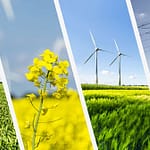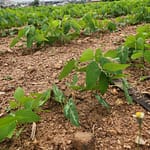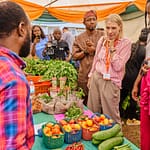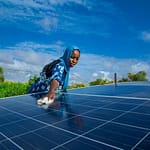Climate change is increasingly becoming a subject that can no longer be ignored. More than ever before, the world is feeling its impact and in a more localized context, Nigeria has experienced some of the worst effects of climate change such as heavy flooding which has translated to the loss of lives, destruction of public infrastructure such as roads, farms lands and homes have been consumed by these floods among other effects. Although Africa contributes less than 4% of global carbon emissions, we have been identified as one of the top 10 regions set to experience the heaviest Impact of climate change.
While this challenge persists, it is expedient that we are ready to mitigate and adapt to the impact of our changing climate. This cannot be achieved if we are not well positioned to attract the much-needed climate finance necessary to implement green projects which is left for us as a continent (Africa) and a nation (Nigeria) to identify.

Although transition finance, a concept where financial services are provided to high carbon-emitting industries to fund the transition to decarbonization, is expected to reach a record $ 1 trillion in 2023, this funding would go to more developed and industrialized economies. Meanwhile, the percentage of climate funding earmarked for developing nations remain abysmal. Unfortunately, we have seen way too little climate finance flowing to developing countries, which are expected to amass the bulk of future emissions.
According to the Climate Policy Initiative, for African countries to meet their climate action commitment, we require $ 2.3 trillion between 2020-2030 and we are not on track to meet our individual Nationally Determined Contributions(NDC) in the race towards Net Zero. For better understanding, the NDC is what each country agrees to do to help meet the global goal to pursue 1.5 degrees Celsius and adapt to climate impact.
While heterogeneity across climate funds remains a bottleneck, it is important we stop playing victim both as a country and continent at large, but rather champion the request for enhanced access to funds that would be used to finance bankable green projects. Currently, these funds are only accessible to accredited recipient governments or subnational entities which simply means that we do not even have direct access to funding which would facilitate green projects.
About 90% of disbursement for climate funds in Sub-Saharan Africa is indirectly provided through regional and international implementing patterns. It is therefore imperative that we are well positioned putting into consideration the various project selection and evaluation criteria which differ per financier.
Africa is rich in natural resources despite still grappling with what our fathers in economics describe as the natural resource curse. However, we have an opportunity to reverse these trends. For example, with the expanded adoption of the use of cleaner energy sources, African countries such as Zimbabwe is well positioned to champion this course through its mining of Lithium which is a major component in the production of batteries needed for electric vehicles.
Nigeria can position itself in like manner to leverage areas of competitive advantage to attract climate financing for projects such as the manufacturing of clean cooking solutions and briquettes which would help reduce deforestation partly caused by the need for wood used for cooking especially in rural areas. We must rise to the occasion and bring our best foot forward at the negotiation table.
Published by Samwel Eviator












